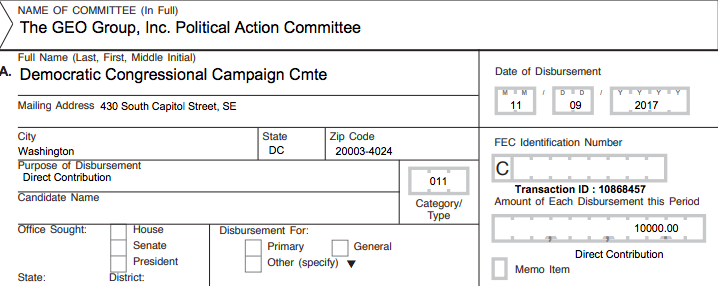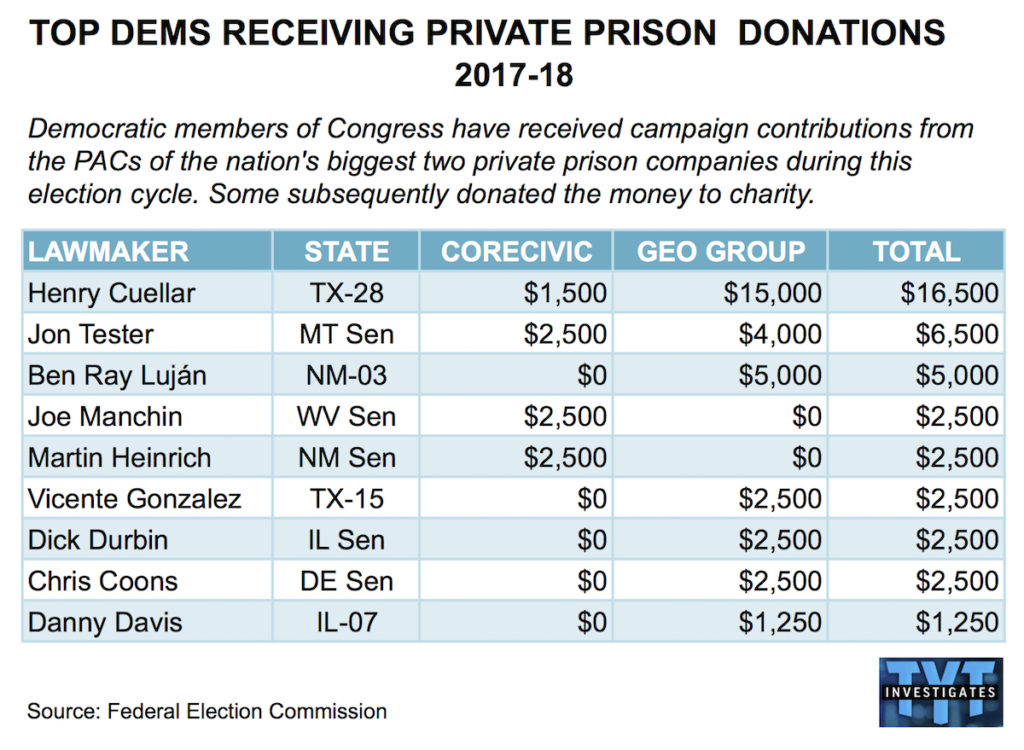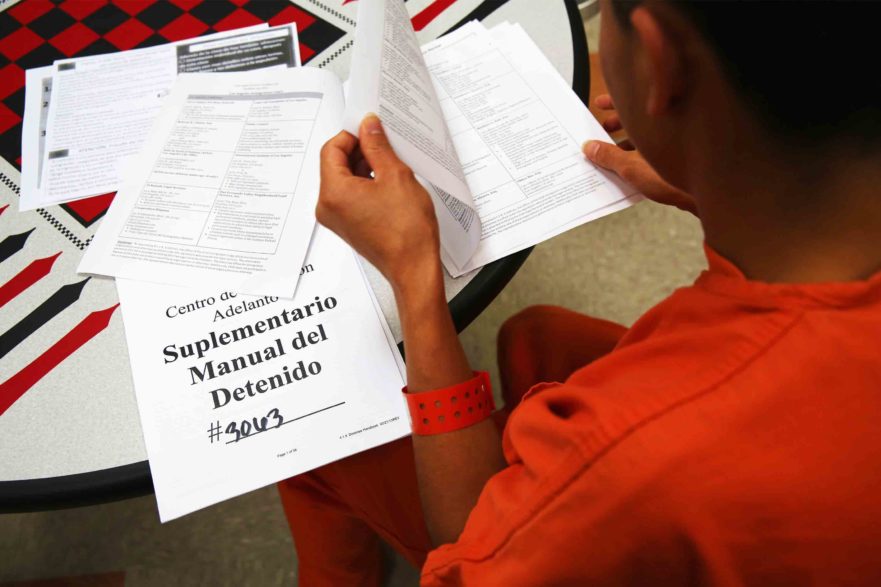An immigrant detainee reads through paperwork at the Adelanto Detention Facility, an Immigration and Customs Enforcement (ICE), detention center in Adelanto, California. The facility is managed by the private GEO Group. Photo by John Moore/Getty Images.
Update: A spokesperson for Rep. Hakeem Jeffries (D-N.Y.) tells TYT that his campaign rejected a donation from the GEO Group PAC. GEO Group PAC has acknowledged this mistake and is amending its campaign finance report. A spokesperson for Sen. Amy Klobuchar (Minn.) told TYT that her campaign rejected an attempted GEO Group PAC contribution and that GEO Group PAC has acknowledged these mistakes and is amending its campaign finance report. This article has been revised to reflect this information.
Democrats have been unified in opposing the harsh immigration policies imposed by the Trump administration, including the separation and subsequent detention of undocumented children and their parents, who are jailed in separate facilities.
The party’s 2016 platform states, “We will fight to end federal, state, and municipal contracts with for-profit private prisons and private detention centers. In order to end family detention, we will ensure humane alternatives for those who pose no public threat.”
The nation’s two largest private-prison companies are reaping the benefits of increased demand for housing undocumented immigrants taken by U.S. Customs and Border Protection (CBP) and Immigration and Customs Enforcement (ICE). GEO Group and CoreCivic have scored hundreds of millions of dollars worth of ongoing government contracts to detain these immigrants, including those who came to the United States to legally seek asylum.
Journalists have documented abuses of and poor conditions for inmates at both GEO Group and CoreCivic prisons. TYT reported last month on a host of abuse allegations leveled at several government-funded organizations that are housing undocumented children detained by the Trump administration.
Despite the Democratic Party’s stated opposition to private prisons and to immigration policies that increase revenue for those prison companies, several congressional Democrats have accepted donations from the GEO Group and CoreCivic in the current election cycle. In addition, the Democratic Congressional Campaign Committee (DCCC) has multiple fundraisers—referred to as lobbyist bundlers—who either currently lobby, previously lobbied, or now lead a firm that lobbies for one of the companies.
Campaign finance records show that the PACs, leadership PACs, and joint fundraising committees of at least 23 Democrats in Congress have received $52,750 in campaign contributions from the PACs of GEO Group and CoreCivic during the 2017–18 election cycle through May 2018. Two representatives appear to have returned donations from the GEO Group PAC, which is reflected in this total. Last November, however, the DCCC received a $10,000 contribution from the GEO Group PAC and during the current election cycle has taken in over $350,000 bundled by four lobbyists closely connected to GEO Group or CoreCivic, records show.

Republican candidates and campaign groups have taken in far more private-prison cash in the 2018 election cycle than Democrats have—$337,200 to the campaign committees, leadership PACs, and joint fundraising committees of 58 members of Congress and $242,500 to national party groups. The GOP is largely supportive of private prisons.
Top Republican recipients of private-prison donations include House Majority Leader Kevin McCarthy ($45,000 from GEO Group and $5,000 from CoreCivic), Texas Rep. John Culberson ($25,000 from GEO Group and $5,000 from CoreCivic), and Florida Sen. Marco Rubio ($25,000 from GEO Group).
Some Democrats have returned or donated the private-prison contributions. Lawmakers from both parties are getting pressured by activists to return their donations—including Rep. Mike Bishop (R-Mich.), who received $1,000 from the GEO Group PAC last October.
DCCC Chairman Ben Ray Luján (D-N.M.) received $5,000 from GEO Group PAC during this election cycle. His spokesperson said that Luján donated $7,000, which includes some donations from previous cycles, “to New Mexico nonprofit organizations that help immigrant children and their families, as well as victims of violence.” Luján received $9,100 from the GEO Group PAC during election cycles spanning from 2008 through 2014, according to Federal Election Commission data.
Luján and Democratic New York Rep. Hakeem Jeffries are both seen as top contenders to become the next House leader for their party, according to Politico. GEO Group reported donating $1,000 to Jeffries’ campaign last November, but Jeffries Communications Director Michael Hardaway tells TYT that the campaign rejected the attempted contribution. “Congressman Jeffries has never received a dollar from a private prison,” he said. The Jeffries campaign has never reported receiving a donation from GEO Group or from CoreCivic, and it’s possible GEO Group was mistaken in its Federal Election Commission filing.
Jeffries cosponsored a 2018 bipartisan bill addressing prisoner reentry into society. The bill was lobbied on for CoreCivic in the first quarter of 2018 by Gephardt Group Government Affairs—run by former House Majority Leader Dick Gephardt, who recently bundled donations for the DCCC. It’s unclear whether CoreCivic supported or opposed the bill, which passed the House in May. However, CoreCivic last year was “aggressively” acquiring reentry facilities, and has called for more federal funding for these facilities, which are commonly known as “halfway houses.” The bill, named the FIRST STEP Act, authorizes $250 million over five years for programs to help former prisoners reenter society. CoreCivic operates numerous reentry centers around the country.
GEO Group lobbyist and DCCC fundraiser Richard Sullivan lobbied on the issue of reentry in the first quarter of 2017. GEO Group, like CoreCivic, operates reentry centers and services. Sullivan previously held leadership roles at two of the top Democratic Party committees: He’s the former finance director of the Democratic National Committee and former treasurer of the Democratic Governors Association.
The Democrats who have received the most money from corporate PAC donations from GEO Group and CoreCivic in the 2018 election cycle are:

The campaign of Sen. Martin Heinrich (D-N.M.) said that it donated to charity the $6,500 it has received from CoreCivic’s PAC since 2010.
The four DCCC lobbyist bundlers who have lobbied for private-prison companies are:
- Gephardt, whose lobbying firm lobbied for CoreCivic this year, brought $18,500 in donations to the DCCC this election cycle.
- Tony Podesta and a number of lobbyists at his now-defunct lobbying firm Podesta Group lobbied for GEO Group. Podesta bundled $156,000 in contributions for the DCCC in 2017.
- Sullivan, who was once a special assistant to fellow DCCC bundler Gephardt, lobbied for GEO Group in early 2017. He brought in $118,300 for the DCCC in April and May.
- Victor Fazio works for Akin Gump, which recently lobbied for CoreCivic. Fazio doesn’t currently represent CoreCivic, but he used to. He has bundled $58,000 for the DCCC this year.
The Democratic Party has another connection to GEO Group: Jeff Berman, a member of the Democratic Unity Commission, which was formed last year to “recommend improvements to insure the presidential nomination process is accessible, transparent, and inclusive,” formerly lobbied for the prison company.
At least one member of Congress has personally invested in a private-prison giant. In her 2016 financial disclosure, Rep. Lois Frankel (D-Fla.) reported having purchased between $2,002 and $30,000 worth of stock in CoreCivic via her Morgan Stanley independent retirement account (IRA). Subsequent financial reports do not indicate that she’s divested this stock. CoreCivic operates two facilities in Florida.
As some Democrats have rejected private-prison cash, others have sworn off all corporate PAC money entirely in an era when “big money in politics” is tied for the top issue driving Americans to lose faith in the nation’s democratic system, according to a recent poll. Alexandria Ocasio-Cortez, a 28-year-old Democrat from the Bronx, this week scored a massive primary upset against high-ranking incumbent Rep. Joe Crowley. Ocasio-Cortez campaigned on a promise to accept no corporate PAC donations, while Crowley received over $1 million in corporate PAC money.
Alex Kotch is an award-winning investigative reporter whose work has appeared in The Nation, Vice.com, International Business Times, and Sludge. Follow him on Twitter.
Follow TYT Investigates on Twitter, Facebook, and YouTube to stay on top of exclusive news stories from The Young Turks.

